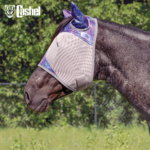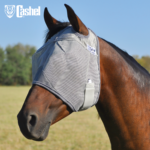If you are experiencing problems when loading your horse into a trailer, you need to understand that it’s a purely instinctive reaction on the part of your horse.

Horses have spent millions of years avoiding enclosed spaces. They?re prey animals, and every self-respecting prey animal on the planet knows that he must never be cornered, let alone on all six sides: top, bottom, left, right, front and back. No wonder horse trailering is such a big problem.
From the horse’s point of view, a horse trailer is nothing more than a metal cave on wheels, like a trap. When a predator is trying to make him get inside, to the horse it seems like a sure death awaits.
It’s Not About the Trailer
A horse trailering problem isn?t about the trailer. It’s usually about your relationship with your horse. It’s about inspiring confidence in the horse and getting him to trust you and your leadership. The more you push and force, the less the horse will trust you and the less he will want to follow your lead. Your success with easily loading your horse into a trailer starts a long way away from the trailer. You need to know how to get your horse to trust you, to respect your leadership and to understand what it is you want from him. The trailer loading is somewhat incidental, although it is an important goal.
The more your horse trusts you, the less he will say “no” to trailer loading and anything else you ask him to do. Learn how to get your horse’s trust and how to communicate in a language so natural that he understands exactly what you want and becomes willing to do what you ask.
Conditioned Response: Comfort and Discomfort
If your horse is already super adverse to trailering, here’s another approach: We all know that you can force a horse into a trailer and shut the door quickly, but there’s a better way to acclimate him. Rather than using force,?teach?your horse to like the trailer rather than to hate it and fear it. Most people push and punish and put pressure on the horse near the trailer…so of course he learns to hate it. If you get him near the trailer and you don’t do any of that, if you just leave him in comfort and leave him in peace, things start to change. Play some games with him at the trailer. Work him away from the trailer and then bring him to the trailer after and leave him alone to rest and relax. He?ll start to view the trailer as a place of safety, peace and refuge instead of the place where pushing and shoving and confinement happen. It becomes associated with comfort rather than discomfort and he’ll become much more relaxed around it and able to do what you ask.





